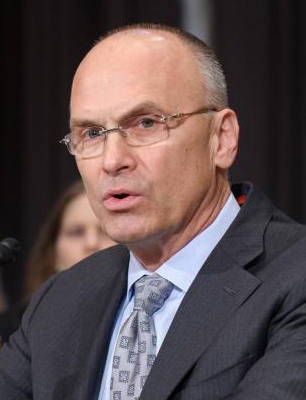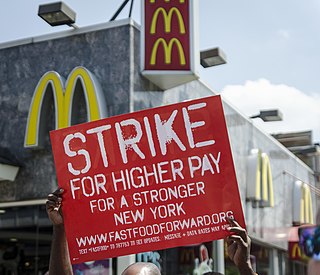Related Research Articles
A minimum wage is the lowest remuneration that employers can legally pay their employees—the price floor below which employees may not sell their labor. Most countries had introduced minimum wage legislation by the end of the 20th century. Because minimum wages increase the cost of labor, companies often try to avoid minimum wage laws by using gig workers, by moving labor to locations with lower or nonexistent minimum wages, or by automating job functions. Minimum wage policies can vary significantly between countries or even within a country, with different regions, sectors, or age groups having their own minimum wage rates. These variations are often influenced by factors such as the cost of living, regional economic conditions, and industry-specific factors.

Gavin Christopher Newsom is an American politician and businessman serving as the 40th governor of California since 2019. A member of the Democratic Party, he served from 2011 to 2019 as the 49th lieutenant governor of California and from 2004 to 2011 as the 42nd mayor of San Francisco.

The National Restaurant Association is a restaurant industry business association in the United States, representing more than 380,000 restaurant locations. It also operates the National Restaurant Association Educational Foundation. The association was founded in 1919 and is headquartered in Washington, D.C.

In the United States, the minimum wage is set by U.S. labor law and a range of state and local laws. The first federal minimum wage was instituted in the National Industrial Recovery Act of 1933, signed into law by President Franklin D. Roosevelt, but later found to be unconstitutional. In 1938, the Fair Labor Standards Act established it at 25¢ an hour. Its purchasing power peaked in 1968, at $1.60. In 2009, Congress increased it to $7.25 per hour with the Fair Minimum Wage Act of 2007.

Andrew Franklin Puzder is an American attorney, author, and businessman. He is the former chief executive officer of CKE Restaurants, the parent company of Hardee's and Carl's Jr., a position he held from September 2000 to March 2017. He was previously a commercial trial lawyer in private practice from 1978 to 1995 who handled many high-profile cases and was active in the anti-abortion movement. On January 22, 2025, President Trump announced his nomination of Puzder to serve as United States Ambassador to the European Union in his second administration.

Californians Against Waste is an environmental advocacy organization that advocates for stronger environmental laws and more recycling at the state and local level. The organization was founded in 1977 and has sponsored numerous successful citizen initiatives. It is headquartered two blocks from California's state capitol in Sacramento.
The New York State Department of Labor is the department of the New York state government that enforces labor law and administers unemployment benefits.

Nancy Skinner is an American politician who served as a member of the California State Senate from 2016 to 2024. A Democrat, she represented California's 9th State Senatorial district, encompassing parts of the East Bay.

Philip Yu-Li Ting is an American politician who served in the California State Assembly from 2012 to 2024. He is a Democrat who represented the 19th Assembly District, which encompasses western San Francisco and northwestern San Mateo County. Prior to being elected to the Assembly, he was the Assessor-Recorder of San Francisco.

Scott Wiener is an American politician who has served in the California State Senate since 2016. A Democrat, he represents the 11th district, encompassing San Francisco and parts of San Mateo County. He is also the co-chair of the California Legislative Jewish Caucus.

Lorena Sofia Gonzalez Fletcher is an American union leader and former politician serving as the president of the California Labor Federation since 2022. A member of the Democratic Party, she previously served in the California State Assembly from 2013 to 2022, representing the 80th Assembly district, which encompasses southern San Diego. She was first elected to the Assembly in a 2013 special election to succeed Ben Hueso, who was elected to the State Senate in a special election.

The Fight for $15 is an American political movement advocating for the minimum wage to be raised to USD$15 per hour. The federal minimum wage was last set at $7.25 per hour in 2009. The movement has involved strikes by child care, home healthcare, airport, gas station, convenience store, and fast food workers for increased wages and the right to form a labor union. The "Fight for $15" movement started in 2012, in response to workers' inability to cover their costs on such a low salary, as well as the stressful work conditions of many of the service jobs which pay the minimum wage.

Maine Question 4, formally An Act to Raise the Minimum Wage, is a citizen-initiated referendum question that appeared on the Maine November 8, 2016 statewide ballot. It sought to increase Maine's minimum wage from $7.50 per hour to $12 an hour by 2020, as well as increasing the minimum wage for tipped employees gradually to the same level by 2024. It would also index increases after 2024 to inflation. As the Maine Legislature and Governor Paul LePage declined to enact the proposal as written, it appeared on the ballot along with elections for President of the United States, Maine's two U.S. House seats, the Legislature, other statewide ballot questions, and various local elections. Efforts to place a competing, more moderate proposal alongside the citizen-initiated bill were unsuccessful.

Since about 1970, California has been experiencing an extended and increasing housing shortage, such that by 2018, California ranked 49th among the states of the U.S. in terms of housing units per resident. This shortage has been estimated to be 3-4 million housing units as of 2017. As of 2018, experts said that California needs to double its current rate of housing production to keep up with expected population growth and prevent prices from further increasing, and needs to quadruple the current rate of housing production over the next seven years in order for prices and rents to decline.
California's Assembly Bill 1066, Phase-In Overtime for Agricultural Workers Act of 2016, was authored by Assemblymember Lorena Gonzalez Fletcher and was signed by Governor Jerry Brown on September 12, 2016. This bill allows farmworkers in California to qualify for overtime pay after working 8 hours in a single day or 40 hours in a workweek. Prior to the passage of AB 1066, farmworkers were only eligible for overtime pay after working 10 hours.

Initiative 77 was a voter-approved ballot initiative in Washington, D.C., to phase out the special minimum wage for tipped employees as part of the national Fight for $15 campaign. In the June 2018 primary election, D.C. voters approved Initiative 77 by a margin of 56% to 44%; however, the D.C. Council repealed the initiative in October before it could enter into force. In 2022, a nearly identical Initiative 82 was approved for the November 8, 2022 election.
California Senate Bill 35 is a statute streamlining housing construction in California counties and cities that fail to build enough housing to meet state mandated housing construction requirements, and exempts construction under the law from California Environmental Quality Act review. The bill was introduced to the California State Assembly by State Senator Scott Wiener (D-SF) on December 15, 2016. SB 35 aims to address the California housing shortage by increasing housing supply. The bill was signed into law on September 29, 2017 by Governor Jerry Brown as part of California’s 2017 Housing Package – a set of 15 bills that provide “an injection of new regulatory and financial resources” for cities.
The Worker Standards Board, Wage Board or Industry Committee aims to improve wages and working conditions for all workers within a specific industry. When implemented along with other regional labor policies, such as paid family leave, the Worker Standards Board is a useful alternative or supplement to a collective bargaining agreement and a formal labor union, when the situation does not support a union.
California Assembly Bill 5 or AB 5 is a state statute that expands a landmark Supreme Court of California case from 2018, Dynamex Operations West, Inc. v. Superior Court ("Dynamex"). In that case, the court held that most wage-earning workers are employees and ought to be classified as such, and that the burden of proof for classifying individuals as independent contractors belongs to the hiring entity. AB 5 extends that decision to all workers. It entitles them to be classified as employees with the usual labor protections, such as minimum wage laws, sick leave, and unemployment and workers' compensation benefits, which do not apply to independent contractors. Concerns over employee misclassification, especially in the gig economy, drove support for the bill, but it remains divisive.

The 2023–2024 session is the most recent former session of the California State Legislature. The session first convened on December 7, 2022, and ended on November 30, 2024.
References
- ↑ Cohen, Rachel M. (August 15, 2022). "California could transform how fast food workers are treated". Vox. Retrieved August 29, 2022.
- 1 2 3 4 5 6 7 Scheiber, Noam (August 29, 2022). "California Senate Passes Bill to Regulate Fast-Food Industry". The New York Times. ISSN 0362-4331 . Retrieved August 29, 2022.
- 1 2 "Governor Newsom Signs Legislation to Improve Working Conditions and Wages for Fast-Food Workers". California Governor. September 5, 2022. Retrieved September 5, 2022.
- ↑ "California's AB 257 Would Make It Much Harder and More Expensive for Restaurant Owners to Operate". www.uschamber.com. Retrieved August 29, 2022.
- 1 2 3 4 Smith, Kevin (January 25, 2023). "California's fast-food workers' rights bill on hold until 2024 ballot - Opponents gathered more than enough signatures to place a referendum on the ballot". San Jose Mercury News .
- ↑ Lee, Kurtis (January 25, 2023). "California Voters to Decide on Regulating Fast-Food Industry - Pre-empting a law signed last year, business groups forced a ballot initiative on state oversight of wages and working conditions". The New York Times .
Legislation signed in September by Gov. Gavin Newsom, a Democrat, would set up a 10-member council of union representatives, employers and workers to oversee the fast-food industry's labor practices in the state.
- ↑ Cheng, Michelle (August 26, 2022). "California's "fast food bill" could give service workers more power". Quartz. Retrieved August 29, 2022.
- 1 2 Ding, Jamie; Hussain, Suhauna (August 29, 2022). "California Senate passes bill to protect fast-food workers". Los Angeles Times. Retrieved August 29, 2022.
- ↑ Murphy, Aislinn (August 24, 2022). "Fast-food franchisees say California's AB 257 could increase costs, undermine business model". FOXBusiness. Retrieved August 29, 2022.
- ↑ "Bill Votes - AB-257 Food facilities and employment". leginfo.legislature.ca.gov. Retrieved January 23, 2023.
- ↑ Hoffman, Ashley (January 18, 2023). "Sacramento Court Pauses New Fast Food Council Law". Advocacy - California Chamber of Commerce. Retrieved January 23, 2023.
- ↑ Hussain, Suhauna (December 31, 2022). "Judge puts hold on California law that could have raised fast-food worker wages". Los Angeles Times. Retrieved January 23, 2023.
- ↑ "Save Our Local Restaurants, "Terms Sheet,"" (PDF). Save Our Local Restaurants. Retrieved September 11, 2023.
- ↑ "Bill History - AB-1228 Fast food restaurant industry: Fast Food Council: health, safety, employment, and minimum wage". leginfo.legislature.ca.gov. Retrieved January 24, 2025.